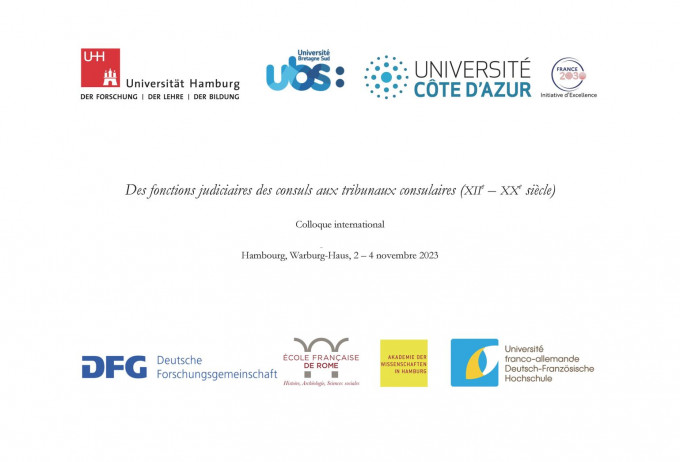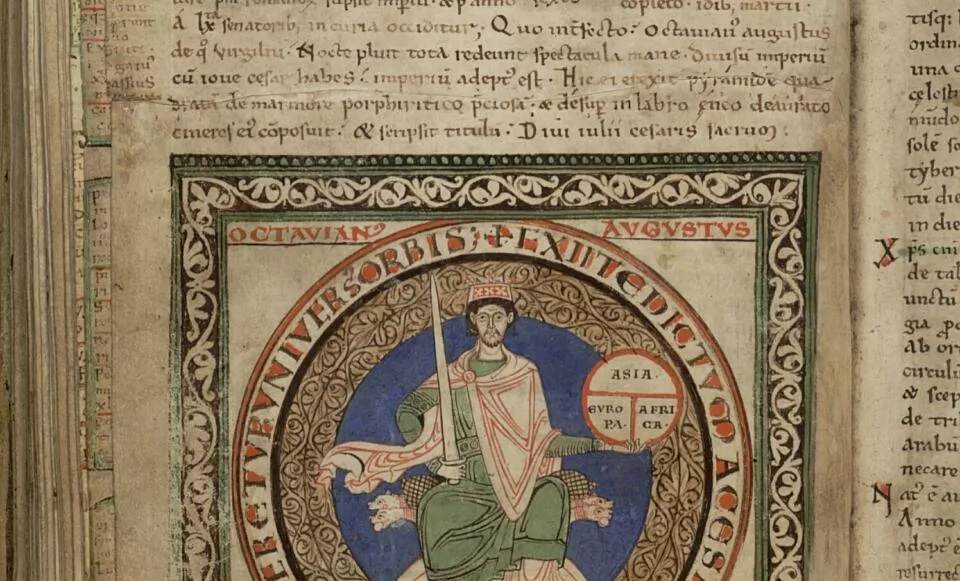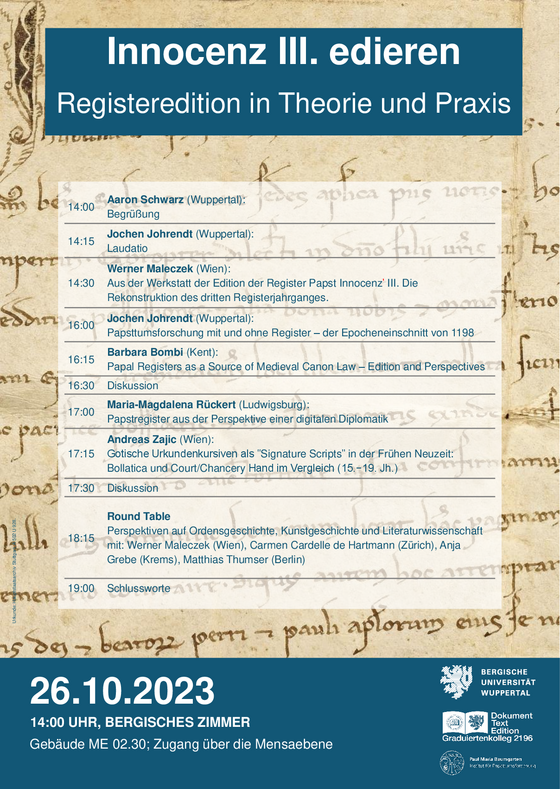A première vue, les notions de justice et de guerre peuvent sembler antinomiques. La conduite de la guerre, qui repose sur la volonté de détruire ou de soumettre l'ennemi, ne répond-elle vraiment à aucune règle ? Peut-elle être associée à cet idéal d'ordre et d'équité caractéristique de la justice ? Pourtant, chaque société a associé les notions de justice, d'ordre et de norme à sa façon de faire et de penser la guerre afin d'en légitimer l'exercice ou d'en encadrer la pratique. Au fil des siècles, acteurs, Etats, armées ou sociétés invoquent des considérations morales, religieuses et/ou politiques pour justifier le déclenchement des hostilités. La violence inhérente à l'exercice de la guerre conduit également à la nécessité de formuler des règles de conduite durant les affrontements. Ainsi, l'application d'une justice en temps de conflit envers les militaires et les civils, la régulation de la violence de guerre et de la transgression des codes moraux et/ou légaux sont des enjeux à toutes les époques et dans tous les espaces. Les récents conflits sur la scène internationale (de la Syrie à l'Ukraine en passant par le Haut-Karabagh) et les procès pour crime de guerre et crime contre l'humanité (de Nuremberg au Tribunal pénal international pour l'ex-Yougoslavie) montrent qu'il s'agit d'une question d'actualité. Le IVe colloque international « jeunes-chercheur.se.s » d'histoire de la guerre de Montréal propose de revenir sur le lien entre guerre et justice sur la longue durée et dans une optique interdisciplinaire. Trois axes d'étude retiendront plus particulièrement notre attention :
- Codifier, réguler et moraliser la guerre
- Rendre la justice en temps de guerre
- Transgresser, punir et réhabiliter
Le premier axe vise à approfondir la formulation par les sociétés de règles et d'outils de contrôle de la guerre ainsi que ses effets collatéraux. Si le code Lieber adopté lors de la guerre de Sécession américaine (1861-1865) figure comme l'un des premiers documents explicitement destinés à la régulation des conflits armés, des tentatives de conceptualiser la notion de « guerre juste », le droit de la guerre et sa bonne conduite sont communes à l'histoire des sociétés. Le terme de jihad, dont l'étymologie se rapporte à l'idée d'« effort, de résistance avec un objectif précis », traduit cette volonté d'encadrer et de canaliser la violence guerrière. En Chine, le corpus des Sept classiques militaires datés de 1078, qui compte L'Art de la guerre (Ve siècle av. N.E.), présente, lui aussi, des idées qui peuvent être assimilées au ius ad bellum (droit de faire la guerre) et ius in bello (droit de la guerre). Les textes hindous opèrent, quant à eux, une distinction entre une « guerre juste » (dharmayuddha) et une « guerre injuste » (kutayuddha). Ils établissent sept critères déterminant le caractère juste d'une guerre. En Europe, les Grecs et les Romains, par exemple, puis la pensée des pères de l'Eglise, particulièrement saint Augustin, ont posé les premiers jalons de la réflexion sur ce qui deviendra plus tard le droit de la guerre, tant sur le plan de l'attribution d'une cause juste à la guerre, que de l'humanisation des méthodes de combat. Entre le XVe et le XVIIe siècle, la professionnalisation des armées européennes et la révolution militaire ont entraîné de grandes évolutions dans la manière de concevoir la guerre et sa régulation. L'ouvrage d'Hugo Grotius, Le Droit de la guerre et de la paix, qui paraît en 1625, le manifeste clairement en jetant les bases du droit international. Aux XIXe et XXe siècles, ce processus aboutit à des déclarations et des traités – telles les conférences de La Haye (1899 et 1907) ainsi que les Conventions de Genève (1929, 1949, etc.) – qui régissent encore la conduite des guerres actuelles. Les propositions de communication pourront ainsi porter sur les normes culturelles et morales, les acteur.rice.s et les ressorts de ces tentatives pour rendre la guerre « juste ». Comment les sociétés cherchent-elles à encadrer un conflit ? Comment définissent-elles les limites de l'acceptable et les frontières de l'interdit ? Quels sont les acteurs à l'origine de ces constructions et quelle efficacité les règles définies peuvent-elles avoir ? Comment évolue cet encadrement, et quelle forme prend-il dans le temps et l'espace ? Quels médias sont utilisés pour le faire et quelles en sont leurs stratégies verbales et iconographiques ?
Le deuxième axe prend pour objet les instances de régulation des conflits et de l'armée. Si des sociétés et des individus se sont penchés sur la nécessité de réguler le conflit ou d'établir les principes philosophiques et morales qui lui permettent d'être « juste », il faut également se questionner sur les modalités d'application de ces préceptes, les acteurs désignés pour les appliquer ainsi que ceux à qui ils s'adressent. Il est aussi question de comprendre comment le droit de la guerre se construit parfois en aval du conflit. Dans le cas de la Deuxième Guerre mondiale, par exemple, des procès contre des collaborateurs nazis locaux sont tenus dès 1943 à Krasnodar en Europe de l'Est, tandis que le tribunal militaire de Nuremberg impose en 1946 des peines sur des dirigeants nazis tout en créant une nouvelle catégorie de crimes – les crimes contre l'humanité. D'autres formes de justice suivant des atrocités de masses prennent formes au XXe et XXIe siècle. A la suite du génocide des Tutsis du Rwanda, le gouvernement crée les Gacaca – signifiant « herbe douce » en Kinyarwanda – où les accusés sont jugés par la communauté locale afin de permettre la reconstruction et la réconciliation. La nature même de ce génocide, où la violence de masse s'est perpétuée entre « voisins », mène à cette forme de justice tout à fait originale. Ici aussi se pose la question des interactions de la branche judiciaire d'un Etat avec l'institution militaire, ou encore la manière dont la justice en contexte de guerre invoque des normes morales, culturelles et/ou religieuses pour se justifier. Les institutions militaires régulent et jugent ainsi les actions de leurs membres à travers la cour martiale, organisant des audiences sommaires pour maintenir l'ordre et s'imposer sur ces membres. Les propositions pourront explorer la manière dont les règles morales et/ou judiciaires sont appliquées. Comment s'articulent la théorie et les pratiques ? Quelles institutions sont chargées de faire respecter ces règles, et de quels outils disposent-elles pour se faire respecter ? Comment la justice s'adapte-t-elle aux actions et aux crimes commis pendant les conflits armés ? Quelle instrumentalisation peut être faite de la justice face aux conséquences de la guerre, notamment par les vainqueurs et une fois les armées démobilisées ? De quelle manière la guerre et la sortie de guerre affectent-elles la mise en place ou l'évolution d'un système de justice formel et informel (réparation, justice transitionnelle, organisation de l'oubli, etc.) ?
Dans la continuité des deux premiers axes, le troisième propose d'étudier les transgressions des codes moraux et juridiques ainsi que la criminalité en temps de guerre. Il s'agit d'analyser les transgresseurs et transgresseuses et leurs actions, leurs dommages, leurs victimes ainsi que les modalités de leur potentielle réinsertion (dédommagement, amnistie par l'oubli, grâce, etc.) Plus spécifiquement, sont encouragées les propositions portant sur les actes transgressifs commis par des individus, des communautés, des institutions militaires et politiques, des opérations de maintien de la paix (Casques bleus), et sur ce qu'ils révèlent des relations entre civils et militaires en contexte de paix, de guerre ou d'occupation. Ceci inclut, par exemple, les actes de pillage, les violences sexuelles, les massacres, les crimes de guerre et les génocides. A partir de quand et selon quels critères ces actes deviennent-ils des crimes ? Il s'agit aussi d'étudier les formes de guerre controversées, recourant à l'esclavage, au mercenariat, à l'usage d'armes proscrites, de stratégies ou de tactiques jugées inhumaines. Comment ces actes impactent- ils les communautés et les individus et comment celles-ci réagissent-elles face à ces débordements ? Comment les institutions judiciaires civiles, militaires et internationales viennent-elles en aide aux victimes, ou comment agissent-elles à leur détriment ? Comment tente-t-on de protéger les populations civiles des exactions et des atrocités commises par les belligérants ? Comment ces actes sont-ils perçus et compris, ou à l'inverse impensés, dans les diverses conceptions de justice au sein d'une même période selon les différents groupes (genre, groupes racialisés, institutions, minorités, etc.) ? Comment les victimes trouvent-elles justice ? Comment, en contexte de guerre, des individus peuvent-ils se trouver simultanément dans la position de victimes et de bourreaux ? Enfin, comment rétablir la paix et la concorde une fois que les armes se sont tues ? Faut-il réintégrer les délinquants et les criminels dans la société ? Comment et dans quelles conditions ?
Le colloque, organisé par le Groupe de recherche en histoire de la guerre (GRHG), est interdisciplinaire et ouvert aux jeunes-chercheuses et jeunes-chercheurs des cycles supérieurs (maîtrise, doctorat, postdoctorat ainsi que des docteur.e.s ayant soutenu depuis un maximum de 2 ans avant la date du colloque et qui n'occupent pas un poste de professeur. e d'université). Le comité scientifique examinera les propositions de communication interrogeant les interrelations entre la guerre et la justice, allant de l'Antiquité à nos jours.
Les propositions de communication peuvent être envoyées en français ou en anglais et devront être soumises avant le 15 décembre 2023, à l'adresse qui suit : justice.guerre.grhg@gmail.com. Elles devront comprendre une présentation de la problématique et de la méthodologie adoptée (2 500 caractères maximum espaces comprises), une brève présentation des sources utilisées ainsi qu'une courte bibliographie générale (10 titres maximum). Elles comprendront également une courte présentation de l'auteur.rice précisant le nom, le prénom, l'affiliation institutionnelle, le niveau d'étude et les intérêts de recherche, le coût estimé de son voyage et les éventuelles possibilités de financement du déplacement et de l'hébergement.
Remarques importantes. Dans la mesure du possible, le comité organisateur cherchera à assurer une aide financière pour le transport et le logement des personnes participant au colloque. Cependant, celles qui peuvent éventuellement assurer leur propre financement grâce au soutien de leur université ou de leur centre de recherche sont invitées à le faire savoir au moment de l'envoi de leur proposition. L'existence du financement externe (même non assuré) est, en effet, un important prérequis pour la demande de subvention générale qui sera déposée pour l'organisation du colloque.
Les communications peuvent être présentées en anglais ou en français. Cependant, une compréhension active du français est requise de la part des participant.e.s afin de pouvoir participer aux périodes de questions qui suivront les interventions, ainsi que le projet de publication des actes du colloque.
Comité scientifique : Jonas Campion (UQTR), Magali Deleuze (RMC Kingston), Benjamin Deruelle (UQAM), Patrick Dramé (UdeS), Marie-Adeline Le Guennec (UQAM), Sophie Hulot (Université Paris 1 Panthéon-Sorbonne) Guillaume Pinet (Université de Tours), Valérie Toureille (CY Cergy Paris Université), Quentin Verreycken (UCLouvain).
Comité organisateur : Aurore Kamichetty (UdeM, Université Paris 1 Panthéon- Sorbonne), Riccardo Lancioni (UQAM, Institut d'études politiques de Grenoble), Chloé Poitras-Raymond (UdeM), Rosalie Racine (UdeM), Thomas Vennes (UdeS), Jeremy Walling (UdeM).
More information here.


















